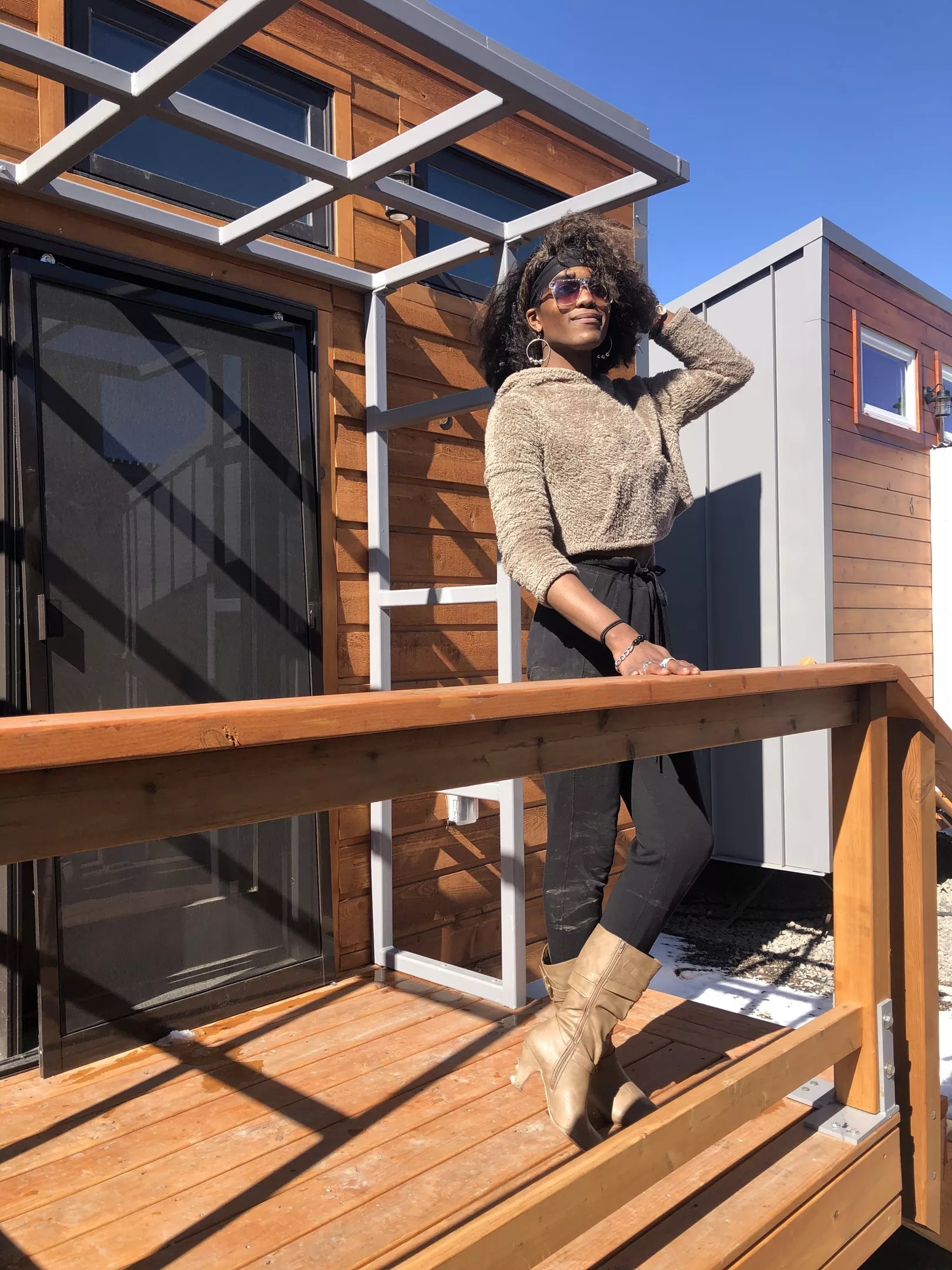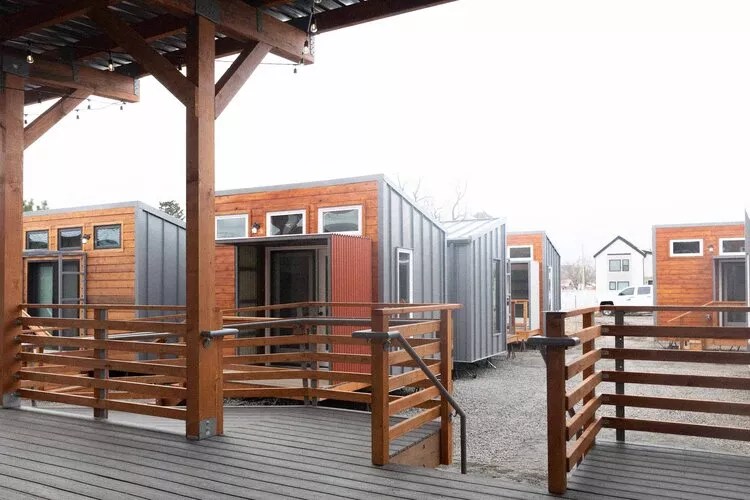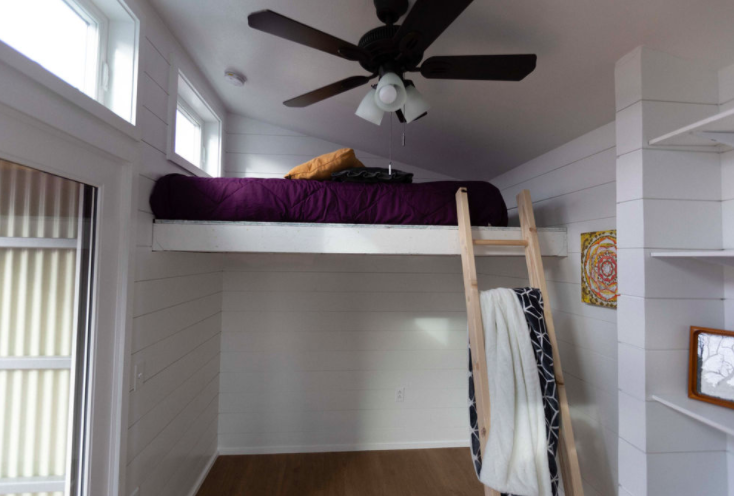
Courtesy of Colorado Village Collaborative

Audio By Carbonatix
For much of the past five years, twenty-year-old Princess Johnson struggled with homelessness in metro Denver. “The main struggle with being on the streets was my substance abuse,” acknowledges Johnson, a trans woman. “Just this year, I started really utilizing the resources.”
With help from a case manager at a local nonprofit, at the end of 2020 Johnson moved out of a tent on the street and into the Women’s Village at Clara Brown Commons, a tiny home village in the Cole neighborhood.
“This is the most stability and routine that I can say I’ve had my entire adult life,” Johnson says.
Now that tiny home village and a coed one in the Globeville neighborhood, both of which are run by the Colorado Village Collaborative, are about to achieve their own form of stability through a major financial boost from the City of Denver.
On February 24, a Denver City Council committee is scheduled to vote on a contract of just over $1 million that would fund the CVC for three years of operations and services at the two tiny home villages. If the full council approves the contract in March, it would be a major increase over the city’s current commitment to such facilities. In 2020, Denver sent $125,000 to the Colorado Village Collaborative, while this newest contract would allot $335,000 annually.

Princess Johnson and thirteen other women live in the Cole tiny home village.
Courtesy of Cole Chandler
“The city has clearly identified that this strategy is part and parcel of its efforts to address unsheltered homelessness. So we’re thrilled that the city is investing to expand the effort and the services across both these sites,” says Cole Chandler, CVC director.
Denver had close to 1,000 people living in unsheltered settings when service providers conducted the last Point in Time count in early 2020. While this year’s unsheltered count was postponed because of the pandemic, those who work with homeless individuals believe the number of individuals living on the streets of Denver has gone up during the economic downturn.
The tiny home villages function as a bridge between living in unsheltered settings on the streets to having stable housing.
“I think we as a city have learned to be more open to innovation and we have been more willing to invest in these interim solutions. We’ve always been in shelter, we’ve always been in housing. This interim space is one the city is becoming increasingly comfortable in,” says Councilwoman Robin Kniech, a longtime supporter of the tiny home concept.
Adds Britta Fisher, executive director of the Department of Housing Stability, “We’re fortunate to have community partners developing innovative strategies like tiny homes to help create a pathway to housing stability.”

The tiny home residents usually come from unsheltered settings.
Courtesy of Cole Chandler
Johnson lives with thirteen other women at the tiny home village in Cole. Both tiny home villages in Denver have community centers where residents can use the bathroom, shower, cook and eat. The all-women’s facility also has weekly communal dinners. Still, Johnson, who refers to herself as a “lone wolf,” is just fine keeping to herself. “I read a lot, I write poetry, I ride my longboard, and I hang out with my best friend,” she says.
Johnson adds that she’s sent out some job applications since she moved into the tiny home village and is now waiting to hear back from potential employers. She’s also gotten an ID and applied for food stamps; those weren’t priorities when she was living on the streets.
“Tiny homes have given me a place to settle down where I’m able to gather my thoughts and prioritize and advocate for myself, if need be,” Johnson says.
According to the Colorado Village Collaborative, five residents of the Globeville tiny home village moved into stable housing in 2020; it’s aiming to get 45 percent of the current residents in the two tiny home villages into stable housing in 2021. In 2020, all of the residents engaged with case managers, and the CVC hopes to achieve that level of engagement again in 2021.
Despite their successes, the tiny home villages have not been without controversy. While Cole neighbors have generally been accepting of the women’s village since it opened in late 2020, the other village’s move from RiNo to Globeville in mid-2019 was met with vocal opposition from some residents of that area, who argued that the city has continuously used Globeville as a dumping ground for projects and services that residents of more affluent parts of Denver would have successfully fought.
But now neighbors who initially opposed that village have accepted its presence, and just “want to make sure that the village doesn’t stay any longer than it’s supposed to,” according to Chandler. The village’s renewable lease expires in mid-2022; the CVC is currently looking for locations for that twenty-person facility as well as a third, new village.
Aside from the proposed contract, Denver City Council recently approved $900,000 in funding for existing and future safe-camping sites run by the Colorado Village Collaborative, which operates one of the two now open in Denver. When the third such spot comes online, Denver’s safe-camping sites would have a total capacity of 130.